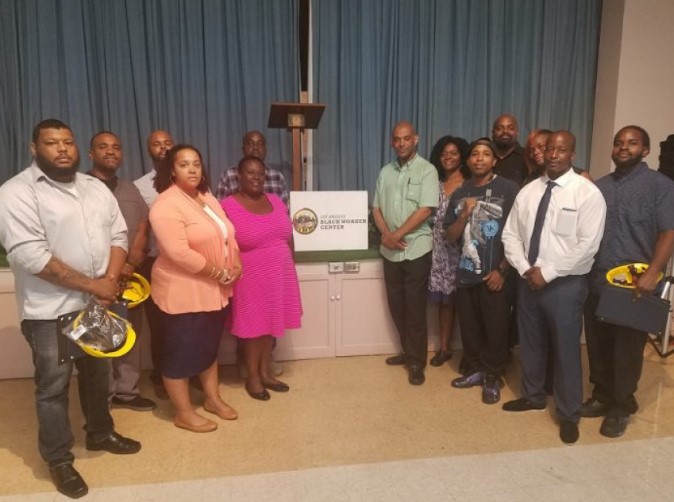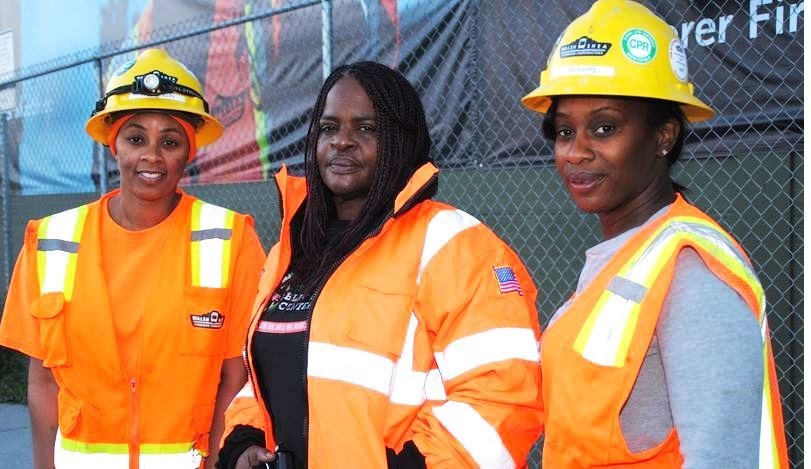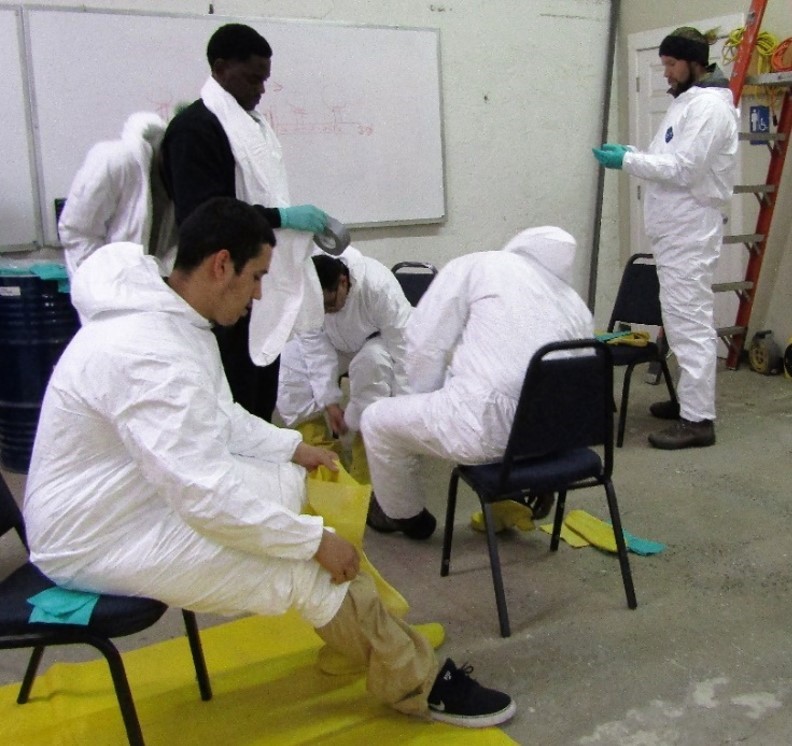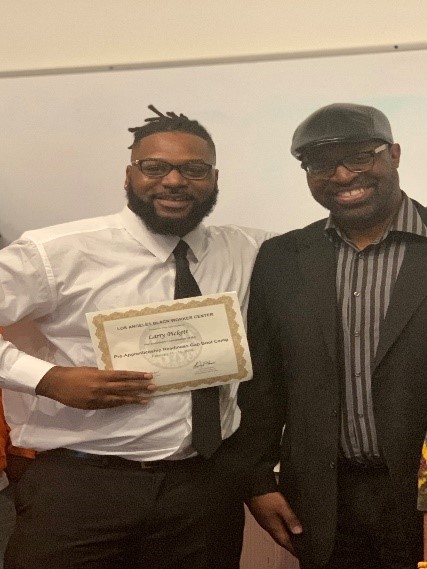Western Region Universities Consortium (WRUC)
Since its inception in 1987, the Western Region Universities Consortium (WRUC) has brought together universities from Arizona, California, and Washington to protect workers and communities from exposure to hazardous materials and waste. Led by Kevin Riley, Ph.D., the consortium’s efforts have focused on preventing and responding to emergencies and disasters and creating pathways to careers in the environmental and construction industries.
Target Populations: WRUC’s ECWTP serves disadvantaged and underserved communities in the metropolitan areas of Los Angeles, Seattle, and Portland.
Training Strategy: WRUC delivers comprehensive training and wraparound services in construction, environmental remediation, and energy efficiency with the support of local organizations.
Impact: WRUC has trained thousands of individuals since 1987 and as an ECWTP grantee since 2010. WRUC has trained about 600 individuals in multiple cities over the previous five-year grant period.
WRUC joined the ECWTP, formerly Minority Worker Training Program, in 2010, with the mission to train individuals in underserved communities disproportionately affected by environmental exposures, for jobs in construction, remediation, energy efficiency, and other environmental fields. Over the last decade, WRUC has steadily grown to benefit hundreds of individuals in the metropolitan areas of Los Angeles, Seattle, and Portland, creating lasting partnerships and dynamic career pipelines.
The WRUC ECWTP consists of the University of California, Los Angeles Labor Occupational Safety and Health Program (UCLA-LOSH) as the lead institution and the University of Washington Northwest Center for Occupational Health and Safety (UW). The consortium also incorporates hazardous waste and HAZMAT disaster preparedness programs with UCLA-LOSH, UW, the University of California, Berkeley Labor Occupational Health Program, the Arizona State University Fulton Schools of Engineering Environmental and Resource Management Program.
UCLA-LOSH and UW ECWTPs have developed in different ways. The UCLA-LOSH ECWTP began as an initiative with the City of Los Angeles in partnership with local labor unions, but today has expanded its reach in partnering with local community-based organizations. While the UW ECWTP main thrust of pre-apprentice construction training programs has remained unchanged, they have evolved geographically from Seattle to incorporate new partners in Portland. Together, these programs are continuing to cultivate relationships and build an engaged network for underserved communities.

(Photo courtesy of WRUC)
Decades of industrial and population growth in Los Angeles coincided with rampant environmental pollution and hazardous waste, which have adversely affected communities of color. Today, in a city of more than 10 million people, the UCLA-LOSH ECWTP is addressing environmental justice head on by collaborating with community partners to provide trainings and job placement to those historically impacted by environmental justice issues.
“From our point of view in Los Angeles, over the years we have really tried to adapt our program with different partners, each with different kinds of job pipelines,” said Riley of UCLA-LOSH and co-principal investigator of the WRUC ECWTP. “In doing so, we make sure that members of the community who are directly impacted by massive environmental contamination have the opportunity to benefit, both directly from an economic opportunity by getting a job, and socially by contributing to help clean up their own neighborhoods.”

(Photo courtesy of WRUC)
In 2019, UCLA-LOSH trained nearly 150 students in the environmental and construction industries in collaboration with diverse partners such as Women In Non Traditional Employment Roles, the Los Angeles Black Worker Center, Center for Employment Opportunity, Compass Rose Collaborative, and the California Department of Toxic Substances Control
“The main evolution for the work we do here in Los Angeles is the ability to recognize not just the needs but the circumstances of our community partners and the programs that they are engaged in,” said UCLA-LOSH and WRUC ECWTP Project Coordinator Yodit Semu. “The participants of our programs are unemployed or underemployed individuals, mainly people of color impacted by environmental and economic injustices.”

(Photo courtesy of Termui Capeling, UW ECWTP)
The UW ECWTP delivers construction-specific training and pre-apprenticeship training to underserved communities. Over the years, they have placed an emphasis on comprehensive job training, holistic wraparound services, and community economic sustainability. These efforts have contributed to nearly full employment for program participants. Through partnerships with the Pre-Apprenticeship Construction Education program in Seattle and Constructing Hope in Portland, the UW ECWTP has helped participants reach their potential and develop skills needed to gain employment or transition to apprenticeship programs.
“Workforce development programs can change the trajectories of underserved individuals,” said UW ECWTP Program Manager Michael Dunn. “I cannot stress the importance of these programs in helping people get a chance under circumstances where historically, the decks have been stacked against them. Our program recognizes the barriers to mobility that a lot of these individuals are facing.”

(Photo courtesy of WRUC)
The longevity and success of the UW ECWTP has strengthened relationships, not only with their community-based partner organizations, but also with local labor unions and local construction industry employers. In some cases, as in Seattle and Portland, labor unions directly recruit participants who have successfully completed the ECWTP trainings, creating a self-sustaining job training to career pipeline.
Overall, our programs have a really good support system,” said UW ECWTP Project Coordinator Terumi Capeling. “Our partner organizations have board members who are in the community and who are always looking out for them. We are also always trying to see how we can adapt to our students’ needs.”
The West continues to be one of the fastest growing regions in the U.S. Given this along with the country’s shift toward environmental market demands of wind and solar energies, the WRUC ECWTP is preparing their students for the jobs of tomorrow. In Los Angeles, which will host the 2028 Summer Olympics, environmentally focused construction is in high demand. The UCLA-LOSH has an eye toward emerging markets. Likewise, in Seattle, because of the growing technology industry, the demand for construction work remains very high.
“Partnerships are very important to us,” said Semu. “The beautiful thing is that we each fill in the gaps of our limitations. For example, our partners lead the recruitment and screening of students, while we provide quality trainers and programming. Strong relationships develop when they flow in both directions.”

(Photo courtesy of WRUC)
L. Pickett, Winter Ready 2 Work Boot Camp Graduate (Los Angeles Black Worker Center)
Pickett completed the Winter Ready to Work Boot Camp in March 2019 and is now working as an industrial painter with the painter's union. Pickett came to the Los Angeles Black Worker Center with two goals: to provide for his family and move his family into a new home. He accomplished both, moving his family into a two-bedroom apartment and still with the painter's union today. Larry is incredibly grateful to the Center and UCLA-LOSH program: "I feel like a man now. I can provide for my family. I would have never dreamt of this opportunity. Thank you, guys so much."
- Empowering workers and fenceline communities facing hazardous exposures
- Mutonomah County creates fund to encourage trade apprenticeships
- Constructing justice: Black workers graduate from new painters pre-apprenticeship
- Seattle program helps fill construction jobs as industry deals with worker shortage
to Top


